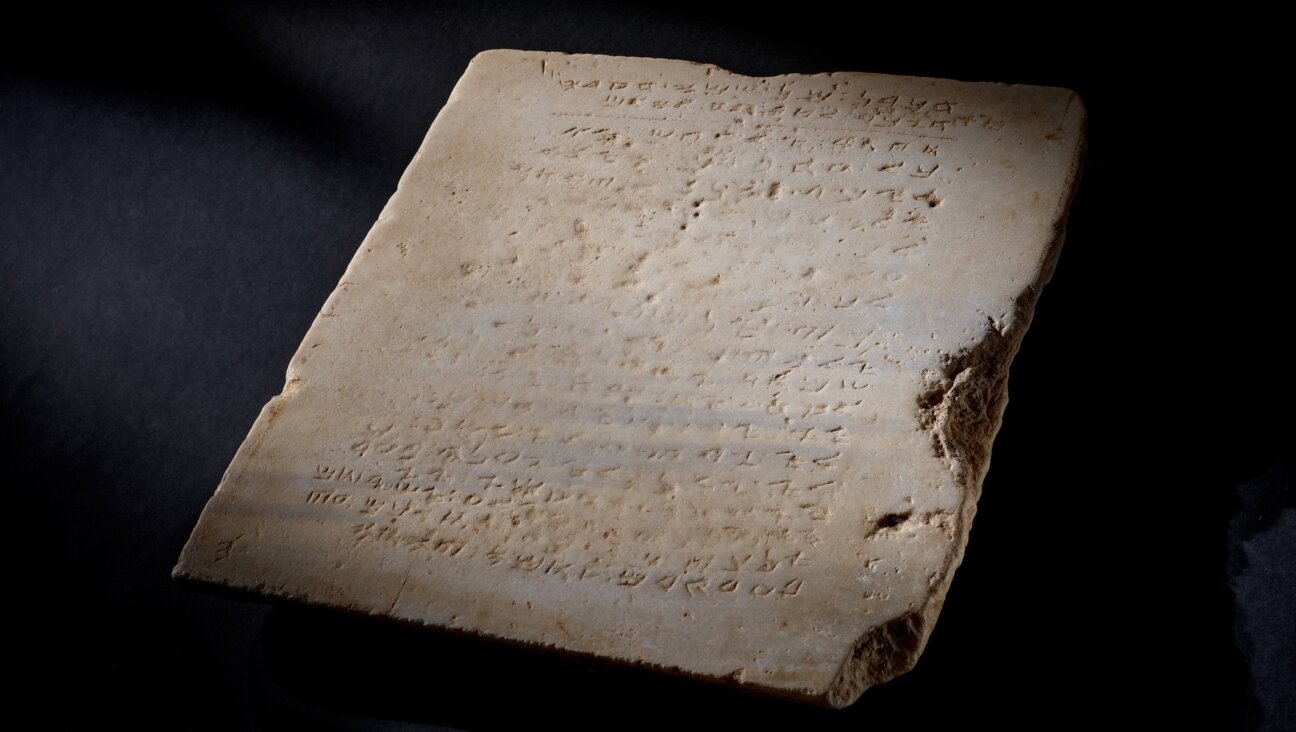Celebrating Renewal
Paul Simon Sings for His Supper and Award at Arts Horizons Gala
“I’m a 59-year-old Jewish guy with no rhythm,” said Marc Summers, host of the October 25 Arts Horizons Gala. Summer, who hosts the Food Network’s “Unwrapped,” was so impressed with the kids of the PS 94 Fly Rhythm Steppers, who entertained the black-tie crowd at the Edison Ballroom, that he asked, “Are you going to teach me that?”
Recipient of Arts Horizons’ Paul Newman Award for ServiceS to the Arts and Children, singer/songwriter Paul Simon (of the duo Simon & Garfunkel), vowed that he would pocket the money raised in the live-auction sale of his “personally signed” guitar so that he could “take Arts Horizons chairwoman Celeste Holm to a fancy dinner.” Holm received an Academy Award for her performance in the 1947 movie “Gentleman’s Agreement,” which was based on a book of the same title, written by Laura Hobson (nee Zametkin). Hobson’s father, Michael Zametkin, was the first editor of the Yiddish Daily Forward in 1897.
Of his family, Simon said: “My father’s family was from the Carpathian Mountains. My mother’s family came from Lithuania.” Simon then sang his 1973 hit “American Tune,” whose lyrics include the lines: “And I dreamed I was flying. And high above my eyes could clearly see the Statue of Liberty.”
Referring to her six husbands and her combined total of 17 grandchildren and step-grandchildren, Arts Horizons’ Outstanding Award recipient, star of stage, screen and television Arlene Dahl, joked, “I left husbands, but kept the grandchildren.”
Recipient of the Celeste Holm Humanitarian Award, Philip Sellinger, managing shareholder of the New Jersey office of Greenberg Traurig, touted his role model, his mother, “who spent a career helping people and today, at 86, is still doing it.” He lamented: “Today it is very easy to criticize lawyers for being self-involved. GT does a lot of pro bono legal services…. We were one of the first firms to represent victims of abuse by the Catholic Church…. The firm has also been supporting an orphanage in Haiti.”
“I’ve been with Arts Horizons for 25 years,” said the organization’s executive director, Elizabeth Halverstam. “We serve 260,000 children a year…[and] produce little miracles. “To date, 8 million children have gone through the program.” Halverstam touted “a wonderful supporter, theater producer and director, Hal Prince” and the LeRoy Neiman Art Center, in Harlem, whose year-round curriculum “opened a new door for kids.” Musician John Devol founded Arts Horizons in 1978.
Humor and Existential Angst on the Menu at America-Israel Friendship League Dinner
Hosted by Kenneth Bialkin and Harley Lippman, the America-Israel Friendship League’s chairman and president, respectively, the AIFL October 20 Partners for Democracy Awards Dinner, held at The Plaza, showcased an upbeat main course with a side order of caution.
Ido Aharoni, acting consul general of Israel in New York, recalled that in 1972, a man asked Israel’s then prime minister, Golda Meir, if the Mann Auditorium in Tel Aviv was named after the German writer Thomas Mann. “Meir replied, ‘No, it was named after Freddie Mann,’” Then, Aharoni recalled, the man asked, “What did he do?” Meir’s reply was, “He wrote a check.”
And it was dollars and what they can accomplish that were also on the evening’s speaker menu. Partners for Democracy Award recipient Charles “Chuck” Davidson, chairman and CEO of Noble Energy, declared, “We are in Israel because we trust Israel.” He told how, 12 years ago, his company was invited to Israel to begin exploration. The company took up this invitation, despite the risk of losing customers that were not Israel friendly. “We knew it would close doors elsewhere,” Davidson said. So be it!” In 2009, Noble Energy and its partners discovered the largest exploration site offshore Israel at Tamar. “It will give Israel a multi-decade supply of natural gas. Israel will never again need to import oil to generate electricity. We have another project — the Leviathan — twice the size of Tamar. It would move Israel into the ranks of a major energy-producing country… a concept totally unimaginable just a few years ago.”
“Israel’s economy is an island of stability,” said award-recipient Zion Kenan, president and CEO of Bank Hapoalim. He recalled, “It was September 1987, the year the bank got access to the U.S. capital market for the first time.” This enabled “Israel to absorb 1 million Russian Jews, saw the creation of the Israeli capital sector and [the ability] to use Soviet talent…. It all started in New York with [the] support of Washington.”
Also honored was the bank’s chairman of the board, Yair Seroussi. Award recipient Shari Arison, owner of the Arison Group, declared, “Business has no boundaries.” Named “Israel’s Most Influential Woman” and “Woman of the Year” by Israel’s financial newspaper, Globes, the American-born Arison — whose father, Ted Arison, founded Carnival Cruise Lines — reiterated: “I believe in financial freedom. Through business and philanthropy you can make… the world a better place for us and future generations….” The award was also presented to Efrat Peled, chairman and CEO of Arison Investments, which operates in 38 countries on five continents.
Former Israeli ambassador to the United Nations Dan Gillerman and AIFL’S dinner chair and honorary president, editor, publisher and real estate developerMortimer Zuckerman, offered their views vis-a-vis current American-Israeli relations. “When I was assigned to the post [to the United Nations], coming from the private sector, I was warned that I would be persecuted, a pariah at the U.N. I want to tell you that each and every day I walked the hall of the U.N. with my head high because I was representing a country far, far better than most other members of the U.N…. A country that makes deserts bloom, makes limbs move with medicine… a place rich with art and culture. “The real love affair between Israel and the U.S., which we celebrate today, is my worry. Israel today is facing not strategic or tactical danger, but existential danger. The relationship can no longer be taken for granted. It never should have been taken for granted. [It’s] why we need you and your support more than ever.”
“The reason the process at Oslo worked 17 years ago,” began Zuckerman began, “was because no one knew! No press. No dinner. It was critical to our success. People who negotiate in private have to compromise — confidentiality is important.” Gillerman cautioned: “Don’t make love, don’t make peace in public! Eyes slightly shut.” He posited optimistically: “It may be because of the fear of Iran that we can be nearer to a settlement than before. Arab neighbors feel equally threatened… fear of Iran…. The real problem is not Israeli, not Palestinian. It is Iranian imperialism.” Zuckerman concurred: ” I agree, Iran is a threat. Iran is a destabilizing force. There is no easy choice for Israel. It’s the evil of the two lessers.”
American Friends of Israel Museum Celebrates Its Renewal Project With a Big Mazel Tov
Titled “A New Beginning,” the October 25 American Friends of the Israel Museum celebrated the completion of the museum’s three-years–long, $100 million Campus Renewal Project with a big-time mazel tov at Cipriani 42nd Street. “This is a power event,” museum director James Snyder told the 550 festively clad guests — many of whom came from outside the United States. “Thirty months after the beginning [of the renovation] — and it came in on time — there is a museum [that is] a power place. Images are richer communicators than words.” A video showing the demolition and reconstruction, the gentle handling of artifacts fragile and ancient — as well as the dismantling and reassembly of massive installations — elicited audible aahs. On site, monster cranes, diggers, welders, craftsmen and museum personnel working to meet the deadline added to the drama. Among the museum boosters that evening were Ingeborg and Ira Leon Rennert, Melanie Arad Fitzpatrick and Michael Arad, the Discovery Channel’s Josh Bernstein, Bonnie Roche-Bronfman and Charles Bronfman, Nathalie and Charles de Gunzburg, New Jersey Senator Frank Lautenberg and his wife, Bonnie, and Judy and Michael Steinhardt.
The July 25 Jerusalem dedication was attended by Israel’s president, Shimon Peres, and prime minister, Benjamin Netanyahu. A special flourish: Fireworks a la July 4! Snyder described the renewed museum as offering “a unique new approach …. [It is] a universal museum, making a statement from Jerusalem, in Israel, about the importance of intercultural and cross-cultural collections.” Snyder justifiably boasted that “286,000 visitors came through the expanded museum in the first months — the highest attendance ever!” The museum is home of the Dead Sea Scrolls, housed in the Shrine of the Book, and the five-acre Billy Rose Sculpture Garden, designed by Isamu Noguchi. It is the site of the Model of Jerusalem in the Second Temple Period.
How Teddy Kennedy Helped Rescue Jessica Katz and Her Family From the Soviet Union
What I remember most from the October 20 “Revisiting the American Soviet Jewry Movement” panel discussion, held at the Center for Jewish History, was the telling of the lifesaving rescue of infant Jessica Katz, daughter of one of the evening’s panelists, Boris Katz. It’s the kind of story that gets showcased on “Oprah” or “60 Minutes.” The discussion related to the recent publication of a book by the Forward’s own Gal Beckerman, “When They Come for Us, We’ll Be Gone: The Epic Struggle to Save Soviet Jewry” (Houghton Mifflin Harcourt). Sponsored by the Forward, the American Jewish Historical Society and the YIVO Institute for Jewish Research, the moderator was the Forward’s editor, Jane Eisner. Following opening remarks by the AJHS’s executive director, Jonathan Karp, and the Forward’s publisher, Samuel Norich; observations by Beckerman, and remarks by historian Joshua Rubenstein about the dialectical and, at times, adversarial issues between refuseniks and dissidents, it was panelist Katz whose personal narrative held the audience spellbound.
Katz, a scientist and former refusenik, was unable to get an exit visa until his wife, Natalya, gave birth to Jessica, the eldest of their three daughters. It was discovered that the infant could not digest milk, and there was the possibility that she would not survive. Local medical experts could not identify her condition. Katz detailed the agonizing search for an answer: the name of the disease. The final, and correct, diagnosis came from outside the Soviet Union, and the formula needed to keep Jessica alive was not available in the USSR. A chain of rescuers — visitors from abroad — would smuggle a can or two of the lifesaving liquid into Russia. Katz dubbed the smuggling operation “A Bridge to Life.”
It was a chance visit by Massachusetts Senator Ted Kennedy, who came to Moscow for a meeting with Soviet leaders, that led to the Katz family being able to emigrate. Katz recalled how he and his wife viewed the promise as either a joke or a politically advantageous moment. They told no one. True to his word, Kennedy was able to convince the Soviets to let the Katz family go.
Katz is currently a principal research scientist at the Massachusetts Institute of Technology’s Computer Science and Artificial Intelligence Laboratory and head of its InfoLab Group. He created the START information-access system, the world’s first Web-based question-answering program. Katz and his wife now live in Cambridge. Jessica and her sisters, Gabriella and Miriam, live in New York.
A message from our CEO & publisher Rachel Fishman Feddersen

I hope you appreciated this article. Before you go, I’d like to ask you to please support the Forward’s award-winning, nonprofit journalism during this critical time.
We’ve set a goal to raise $260,000 by December 31. That’s an ambitious goal, but one that will give us the resources we need to invest in the high quality news, opinion, analysis and cultural coverage that isn’t available anywhere else.
If you feel inspired to make an impact, now is the time to give something back. Join us as a member at your most generous level.
— Rachel Fishman Feddersen, Publisher and CEO





















